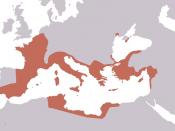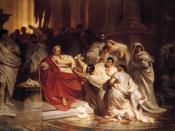Throughout his life, William Shakespeare wrote over thirty plays, comments on politics as well as the human condition. His purpose in writing so much was not only to entertain the common people, but also to inform them, and in some cases to sway them to his beliefs as well, as most writers do. Shakespeare's main political view found in Julius Caesar was an anti-assassination stance because of the events before and after Caesar's death.
Shakespeare first gives his position on assassination before Caesar dies, when he writes the character of Brutus as being tormented by the fact that he has agreed to kill his dear friend Caesar. Brutus knows Caesar is becoming a dictator, but that still does not erase his loyalty of friendship. If Shakespeare had not been averse to assassination, he would not have made it so hard for his characters to do. Cassius, though he fails to see Caesar's power as anything more than cowardice in Caesar's enemies, only wants to eliminate Caesar to ascertain power for himself.
By including this in the play, Shakespeare is saying that the murder of a corrupt leader doesn't necessarily lead to the installment of a benevolent one, so assassination as a means of political change is, in effect, useless.
Shakespeare's disdain towards assassination comes across most strongly in the conclusion of the play, when we learn that all eight of the conspirators have died, most believing that Caesar's ghost was responsible for their defeat and deaths. Could the master playwright have meant this be a warning to potential assassins, that no matter what, you will still be repaid? Cassius is so quick and willing to die a dishonorable death due to misinformation that he must have believed that a worse death than suicide was meant for him at the hands...


